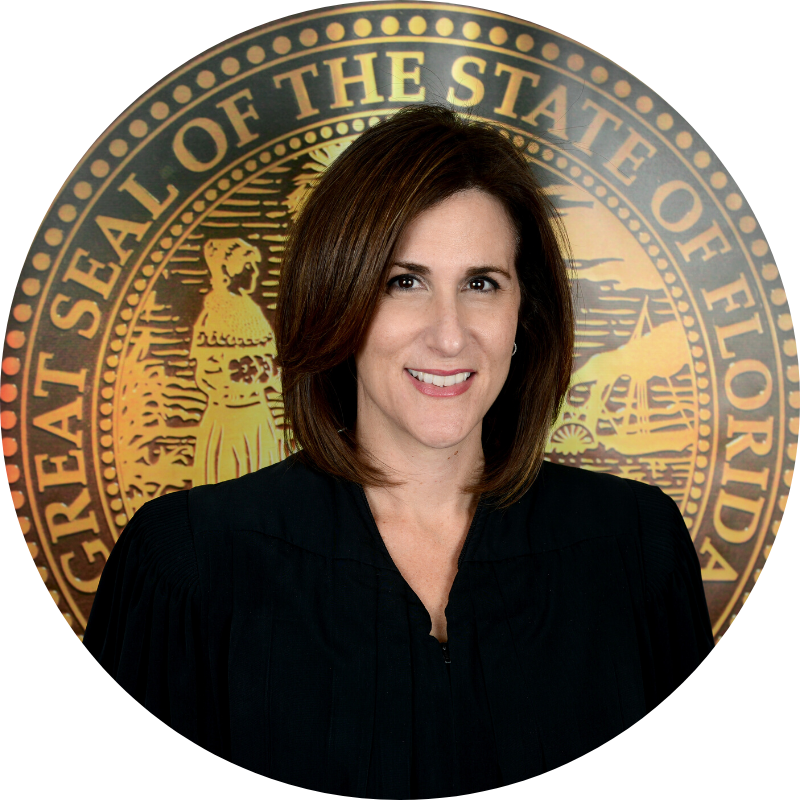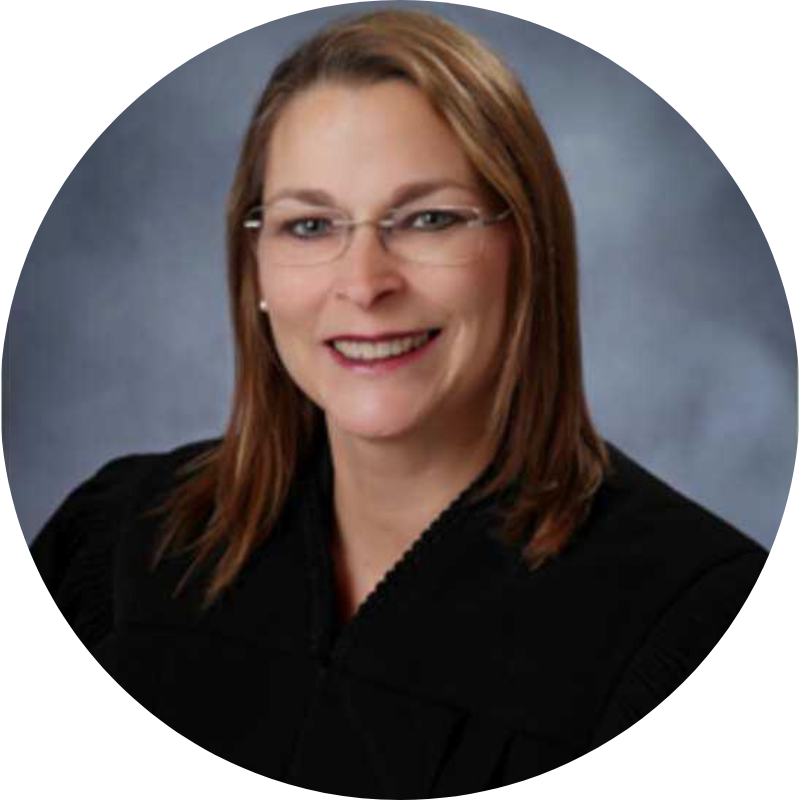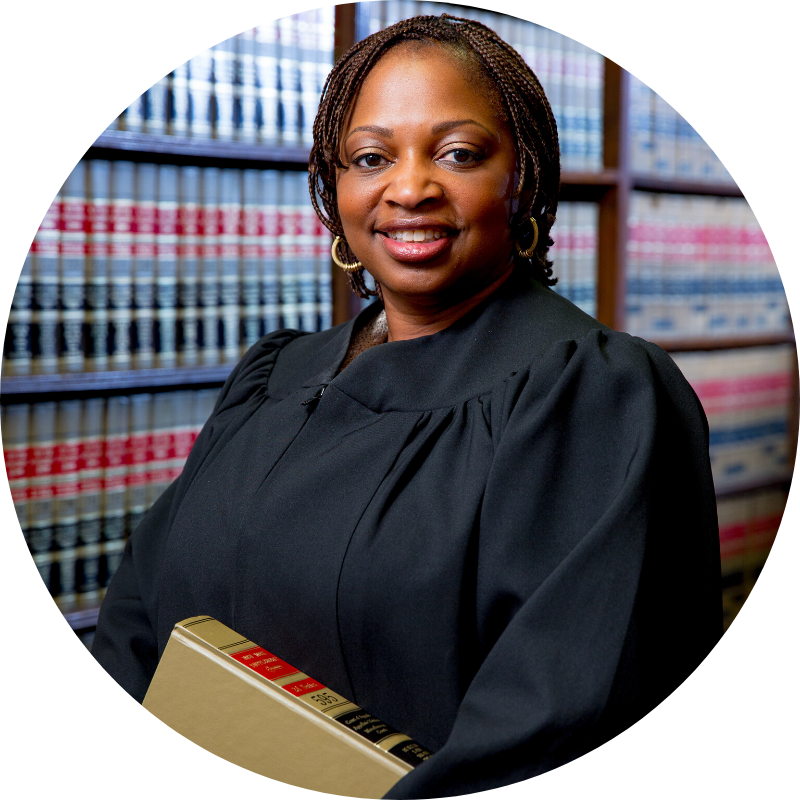A View from Our Members on COVID-19
Written by National Association of Women Judges|April 30, 2020|COVID-19
COURTS ON THE FRONT LINE: PROVIDING ACCESS TO JUSTICE
WHILE PROTECTING PUBLIC HEALTH DURING A PANDEMIC
A View from our Members

Hon. Lisa Walsh
Past-President, NAWJ
Circuit Judge, 11th Judicial Circuit
Miami-Dade, Florida
In March, 2020, United States court systems began responding to the COVID-19 pandemic’s widespread effects upon our legal system. Federal, state, administrative, and military courts have implemented many executive orders and policies while suspending normal operations. From rural to urban jurisdictions, serving every demographic of our nation, we all have struggled to respond quickly to the demands of providing access to justice, while adhering to executive orders to preserve our public health. And despite the challenges, most of us have continued to serve at every level of court.
NAWJ members, including judges at every level of court, and different jurisdictions, have experienced different challenges in responding to the pandemic. Our strength lies in our membership, in sharing our experiences, learning from each other and implementing best practices within our own jurisdictions. Following are the experiences of four judges who serve in the trial courts in California, Michigan, New York, and Louisiana, as well as my own experience in Florida. Even NAWJ has had to make changes to respond to the pandemic to protect the health of NAWJ personnel while continuing to provide programming and service to its members.
The common thread between our experiences is our mutually-shared culture of collaboration and support. Some states, like Michigan, saw the pandemic as an opportunity to accelerate changes to the criminal justice system. Others, like Louisiana, were able to quickly mobilize all stakeholders to address mission-critical courts to provide needed services to vulnerable populations. Here is what we learned.

Hon. Bernadette D'Souza
President, NAWJ
Judge D’Souza first addressed the steps taken as NAWJ President to inform our members of changes made within NAWJ in response to COVID-19. NAWJ staff continues to work remotely and full-time, in order to continue to serve our members around the country. Judge D’Souza created a Taskforce on COVID-19, co-chaired by California judges, Hon. Elizabeth White, NAWJ Vice-President of Districts, and Hon. Elizabeth Lee, NAWJ Treasurer, to address how the virus has impacted justice systems around the country. This taskforce, together with existing committees, is actively engaged in developing programming related to the pandemic, which include podcasts on how the justice system has been impacted and best practices for courts going forward.
President D’Souza has also reconvened the Technology Committee, created by President Tanya Kennedy in 2018. As committee chair, I will be working together with committee members to plan monthly NAWJ webinars addressing the practical challenges in our courts, the substantive concerns about modes of operations, and the effects upon our constitutional norms and our litigants. Our first webinar will be held on May 13, at 2:30 p.m. EST and will feature four of our Chief Justices – The Honorable Anna Blackburne-Rigsby, Chief Judge, District of Columbia Court of Appeals, The Honorable Tani G. Cantil-Sakauye, Chief Justice, Supreme Court of California, The Honorable Susan Christensen, Chief Justice, Iowa Supreme Court, and The Honorable Bridget Mary McCormack, Chief Justice, Michigan Supreme Court. These four NAWJ members and Chief Justices will speak about the rules and policies they implemented in their courts to maintain access to justice while preserving public health.
In addition to webinars and podcasts, NAWJ will be hosting open forums within our Districts, to enable members to share ideas and best practices for serving our courts.
These technological platforms – webinars, forums and podcasts – will allow all of our members to interact, to learn from each other, and to develop effective methods to function under suspended physical operations.

A View from Louisiana
Hon. Bernadette D’Souza
Judge, Domestic Division - Civil District Court, New Orleans
Louisiana has continued to maintain operation of mission critical courts, while suspending operations of all non-essential matters. New Orleans has reduced operations in the Civil Court to a single duty judge per week to address urgent matters. Judge D’Souza commented, “it has been a challenging time to get the system going to work remotely,” as she and her fellow jurists continue to work at the Family Court on emergency duty, handling petitions for temporary protection for victims of domestic abuse and other emergency civil matters. Judge D’Souza hosted a statewide roundtable to discuss improving methods of providing service in the Family Court.
I asked whether Louisiana was better prepared for emergency operations because of its experience during and after Hurricane Katrina. Judge D’Souza remarked, “having gone through Katrina, we have all experienced what disasters do. But this is totally different than Katrina.” In the wake of Hurricane Katrina, “we were able to set up makeshift clinics and disaster relief areas for those seeking help.” In contrast, now, litigants, lawyers, law enforcement, witnesses and judges must remain physically apart. After Katrina, “victims could pick up flyers at the disaster relief centers.” Now, there are more limits on how to give information and provide service. Many victims of domestic abuse are left without option than to stay at home with their abuser to prevent the spread of Covid-19.
However, Judge D’Souza explained that the collaborative efforts of all justice stakeholders in the aftermath of Katrina provided Louisiana with a collaborative roadmap to solve problems now. For example, a nonprofit in New Orleans, Family Justice Center, which staffs a one-stop assistance center for victims of domestic violence, is assisting the courts now by giving litigants a portal to remotely file petitions for protective orders without having to travel to the courthouse. The existing network between the Family Justice Center, Clerk of Court and the Court will enable all stakeholders to work collaboratively to develop creative solutions to serve the needs of litigants in domestic violence cases and prevent violence.
Judge D’Souza also commented, “mentally, we are better prepared than any other place in the country, because we have experienced a breakdown in services.” Her experience developing methods for litigants to file domestic violence petitions remotely is a template for developing solutions. “In terms of volume, we can do it.”

A View from Michigan
Hon. Michelle Rick
Chief Judge Pro Tem, 29th Circuit Court, Clinton and Gratiot Counties
Judge Rick’s docket includes family, criminal and civil cases. She reported that “initially when the pandemic hit in Mid-March, each jurisdiction came up with local administrative orders,” but later, the Supreme Court of Michigan determined that it made more sense to issue directives to Michigan’s 83 counties to uniformly define how courts would operate across the state.
Michigan courts give priority to criminal cases where defendants are incarcerated. Criminal justice stakeholders have worked together to determine how to release some incarcerated defendants without risking public safety. The Supreme Court Chief Justice and NAWJ member Hon. Bridget Mary McCormack and the President of the Sheriffs’ association issued joint guidance, encouraging Courts, jails, prosecutors and defense attorneys to determine instances where inmates could be safe to release. Serendipitously, last year, the Chief Justice and Governor commissioned a task force to make recommendations concerning pretrial incarceration of criminal defendants. The task force recommendations have since been released, and provide guidance for courts to consider when making bail decisions. In addition to removing inmates from jail, all stakeholders are working together to address frail or ill populations in jail to protect the health of inmates.
To restore court operations, Chief Justice McCormack convened a technology work group to ramp up virtual court operations with the use of videoconferencing and other technology. The circumstances of the pandemic have accelerated statewide efforts to implement technology platforms to enhance the courts. Even so, Judge Rick notes that there can be challenges, particularly in rural areas. “Because my jurisdiction is rural, it is not always possible for people to access the internet. In ordinary times, we could route them to a library to use a public terminal there. Now, that isn’t an option. Communication by posting on website does not reach all users. Nor does livestreaming. We are doing our best to communicate broadly to the residents in our community.”
While all non-emergency hearings have transferred to a videoconferencing platform, there have been requests by attorneys who prefer to be present. The courthouses will allow in attorneys who wish to appear in person, even though courts are operating with limited staff and are restricted to less than 10 people in a courtroom. She noted that in her community, which is smaller and close-knit, attorneys have been working collaboratively to coordinate discovery and witness depositions by video.
Judge Rick remarked that Michigan is bracing for a “tsunami once the pandemic orders are lifted. There are a lot of cases in holding patterns.” She noted that better-funded communities “have more tools in their toolbox” to provide access to court, while in more rural counties, there is less funding to enable implementing new technology. Michigan’s State Court Administrative Office is helping all courts, and offers best guidance and best practices for triaging cases. Because stay-in-place orders and social distancing complicates effecting service of process, judges have been encouraged to forebear on issuing bench warrants for failures to appear, defaults and to refrain from strict enforcement of time guidelines. Likewise, evictions are on hold.
Like all state and federal judges, Judge Rick is concerned about the suspension of jury trials and wonders when we will be able to safely return to conducting jury trials. “What is the right answer? Should charges be dismissed? What do we do about that? How do the constitutional rights come into play in light of a public health epidemic? Do they bend or do we bend?”

A View from California
Hon. Tamila Ipema
Past-President, NAWJ
California Superior Court Judge, San Diego County
Judge Ipema is assigned to a criminal docket in San Diego County. To comply with shelter-in-place orders, her court has reduced operations to four courtrooms in downtown San Diego, three in the North, three in the East and three in the South sections of the county. Preliminary hearings are being conducted by videoconferencing. As in Michigan, the prosecutors and defense attorneys are working together to try to release inmates who are not risks to public safety. If the parties cannot agree, the courts are conducting bail hearings on motions for release.
In addition to her criminal cases, Judge Ipema is volunteering to handle civil harassment restraining orders, temporary ex parte petitions, bail hearings and arraignments. The California Judicial Council has created a statewide emergency bail schedule applicable to all felonies and misdemeanors. Specifically, for designated crimes, the dollar amount of required bail has been reduced to $0 such that the defendant may be released from custody without the payment of any form of monetary bail.
Judge Ipema’s court is experiencing many challenges. The backlog of cases is significant. “We might have to do night court to take care of the backlog. Thousands of cases and trials have been pushed back six months.” Currently, family court judges are handling temporary restraining orders and other emergency matters, including emergency motions to suspend or alter custody arrangements. Like many other jurisdictions, on civil matters, California is implementing videoconferencing platforms to “keep the wheel of justice turning.” Some platforms have offered to assist access with some fee waivers for indigent litigants.
Now that states are beginning to contemplate gradually opening up the country, California courts have convened committees and subcommittees to create a roadmap for conducting proceedings once courthouses are again open. Judge Ipema serves on the civil division subcommittee working on limited civil matters such as civil harassment orders and unlawful detainers. For now, the focus remains on using technology to provide hearings on civil matters now to mitigate the future backlog, “so we won’t be paralyzed and overwhelmed once the courts reopen.”
I asked Judge Ipema what she foresees as the lasting effects of changes made in the court systems once the threat of the virus has passed. The innovations created by necessity will “change the way we do business.” If something makes us more efficient and saves money and time, we should learn from that exercise. However, Judge Ipema warns about the lasting effects of suspension of constitutional provisions and rules. She opines that “since 9/11, we have created emergency rules and laws -- we think they are temporary and then, the shortcuts we created continue and the rules start bending as we go forward, chiseling away at our constitutional rights.” She believes we must be on our guard to preserve our constitution as we move forward.

A View from New York
Hon. Kathy J. King
District 2 Director
Supreme Court Justice, Kings County, Brooklyn
Judge Kathy King presides over a docket of civil, and guardianship cases, in a court having the highest volume of court filings in New York State. New York also has the highest concentration of coronavirus cases and deaths in the country. Judges have not been spared. Tragically, Judge King’s sister-in-law passed away from the virus. Two of Judge King’s judicial colleagues have recently passed away from the virus. Luckily, her son was able to travel back to the United States from Europe on the eve of the travel ban. Judge King, like all New Yorkers, initially suffered from anxiety as a result of the impact of the virus. “It took two to three weeks to ground myself. Initially, I felt aimless since the court system was still trying to grapple with how to function and there was no communication with my colleagues, then I gradually got myself on a schedule and got a routine.”
Despite the personal strain on the judiciary in New York, judges have continued to work under an order to address only emergency or essential matters. At the onset of the crisis, Judge King, was an assigned judge for essential matters for one week and reported to the courthouse, where she heard an application to appoint a temporary guardian, a stay of garnishment, and an order to show cause to vacate a stipulation in a matrimonial action based on recent allegations of harassment. The Chief Judge has since spearheaded the transition of essential and non-essential matters to a technological platform. Judge King realized, “I can access certain things on my computer and get things done. Now we have a routine. Every day at 11:00 am, I have a teleconference with my staff. We review our activity report which contains our conference calendar, decisions being worked on, emails, and NAWJ matters.”
The Chief Judge’s statewide initiative also directs judges to conduct videoconferencing, to hear oral arguments on motions. Judges are working to adapt videoconference platforms to conduct different types of hearings. Judges are required to file daily administrative reports of their activities, including the number of cases resolved per day, types of disputes, and details about how they are moving their caseload.
There have been significant challenges for New York State courts to transition to remote operations. Because the courthouses are ordered to be closed to the general public, orders may not be filed properly or served. The failure to properly file or serve orders may affect substantive rights. There are difficulties serving parties, especially those who are self-represented.
The infrastructure is dated, which restrains judges’ ability to discharge their duties. Because judges cannot be in physical proximity with staff or personnel from the IT department, judges have self-trained using video tutorials. Judges have felt challenged in working remotely because they are restricted from entry into the courthouses and have not been granted virtual access to their desktop computers. Judges could work more efficiently if granted access to their cases and files. When asked to compare the New York federal courts to the state courts, Judge King replied that the Eastern District facility is modern and replete with up-to-date technology. “They are conducting operations without missing a beat.” The Kings County courthouse, in comparison “was built in 1939. There are areas where you cannot get Wifi or cell phone reception.”
I asked whether New York’s experience after 9/11 helped lay the groundwork for the judiciary’s response to the pandemic. Judge King replied that 9/11 was restricted to a finite space in lower Manhattan and did not significantly impact operations in Brooklyn. In contrast, “this is comprehensive, invasive and affects all users of the courts.”
I asked about whether our current modes of reduced and technologically-enhanced operation may have a damaging impact on our justice system. She worries about the suspension of individual rights and the impact upon the right to jury trial. “Would masks have to be worn or social distancing adhered to? How will these practices impact jury selection and jury trials?”
Judge King is proud of her colleagues. “We have a weekly conference call with the administration. The judges are ready, willing and able to do their work. They want to do what they are paid by the state to do – which is to adjudicate matters. Despite the challenges in working remotely, they are putting their best foot forward and making lemonade out of lemons.” Judge King believes that there are some positive lessons learned from this experience. “This may give the users of the civil court system an option, the ability to conduct virtual proceedings instead of in court appearances.” In the past as a guardianship judge, “there were a number of occasions where I had to conduct home hearings, taking my entire staff on a field trip to the ward’s home.” The post-pandemic experience may change those proceedings to enable videoconferencing instead.

A View from Florida
Hon. Lisa Walsh
NAWJ Past-President
11th Judicial Circuit, Miami, Florida
I learned so much from speaking to my NAWJ sisters about their states’ responses to the pandemic. Like many other states, Florida initially reduced all operations to emergency mission-critical matters only, then began encouraging judges to conduct as many proceedings as possible by the use of technology. In Miami, we created a pandemic work group comprised of administrative judges from every division.
Our IT department quickly implemented the remote videoconferencing licenses purchased for all judges. What made the process so successful was our IT department’s connection of the videoconferencing platform to our existing electronic filing system. We connected our systems for scheduling and sending service in order to schedule video hearings and serve notices with one click. It took several weeks to get the entire circuit up to speed, but now, we are conducting full calendars in our civil, family and probate courts. I serve as the Administrative Judge for our Appellate Division, and also handle international arbitration cases, and we are completely operational, conducting videoconference oral arguments and electronically filing our opinions and orders.
Criminal, domestic violence and juvenile courts have proven more challenging, because of the need to have the physical presence of some litigants. In the initial weeks, our criminal court reduced its footprint to only a few open courtrooms, and quickly retrofitted those courtrooms to allow for remote appearances by video. However, judges and clerks still must physically be present in criminal and juvenile court to operate these platforms. The most important priority in our criminal courts has been to reduce incarceration because of the public health concern. Our criminal courts have conducted hundreds of bail hearings, in an effort to reduce the population of the jails to protect public health, while making case-by-case decisions to protect public safety. The prosecutors, defense counsel, jail officials, and police agencies have worked together to identify those inmates who could safely be released.
I am so proud of my judicial leaders and colleagues who have worked so hard to pivot quickly to this “new normal,” while trying to minimize the interruption in the critical service we provide. I do fear the lasting effect of these emergency changes upon our rules, laws and constitutional provisions. We have been asked to begin working toward a solution to handle jury trials. It is more than likely that jurors will not soon obey jury summonses for fear of contracting the virus – we all have that concern. But we cannot stave off jury trials for long, especially in criminal cases. I am also concerned about the likely civil backlog, even given our best efforts.
If there is one common thread, a common theme, it is the likelihood of success through open collaboration between all participants with an interest in keeping our courts open and working. Only through working together and listening to each other will we find the best solutions and practices to work for our courts.
NAWJ will explore these concepts, ideas, and practices in a series of webinars, podcasts and open forums, where we will be hearing from our Chief Justices, lawyers, law professors, deans and others to help us develop our blueprint as we move forward. Whether in the medical, legal or other fields, working during this pandemic has been described as fixing the plane while in flight. We welcome all NAWJ members to work together to ensure the future health of our courts.
